RICH REACTIONARIES
Bolivians burn cars, buildings as anger widens over Camacho's arres
Protesters in Santa Cruz region attack buildings and block highways to protest the arrest of right-wing opposition leader Luis Fernando Camacho.
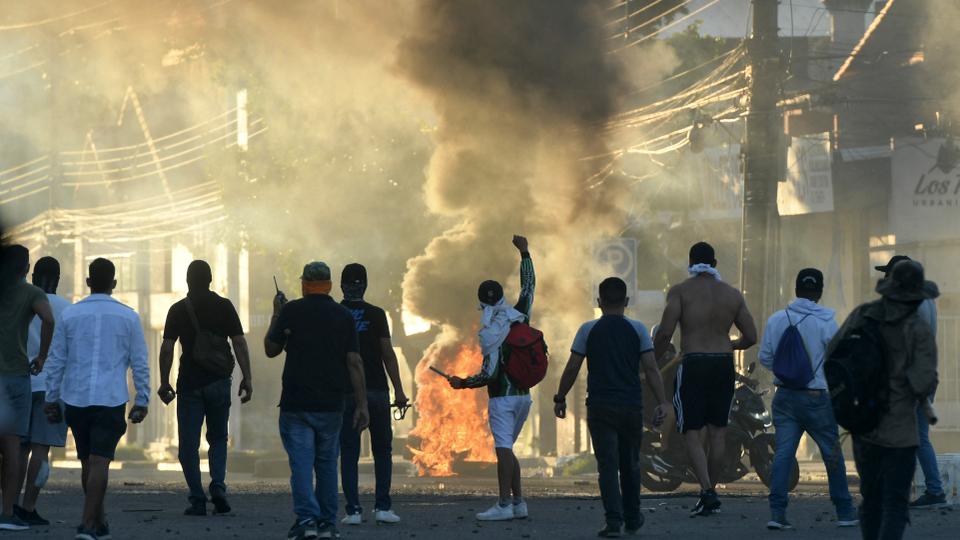
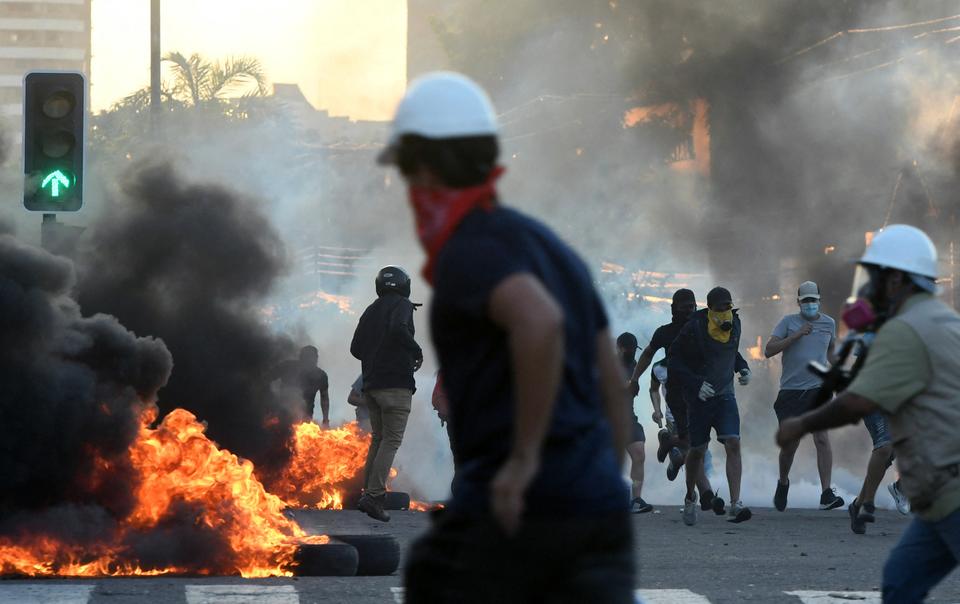
'It was not a coup'
The governor became a face for the right-wing opposition movement as a civic leader who called for leftist Morales to step down in 2019.
On Twitter on Friday morning, Camacho's communications team said the fallout from the contested election "was not a coup, it was a fraud."
Camacho also led weeks-long protests snarling trade from the region through last month, calling for the government to move up a census date that would likely give Santa Cruz more political representation and tax revenues.
The government has not said how it will respond to Friday's roadblocks, though some military forces were spread throughout Santa Cruz late Thursday.
In the last round of protests, government-allied groups violently clashed with Camacho supporters.
READ MORE: Bolivia detains main opposition leader as tensions spike
Protesters in Santa Cruz region attack buildings and block highways to protest the arrest of right-wing opposition leader Luis Fernando Camacho.

Protesters in parts of provincial capital torch cars and tires and hurl fireworks toward police forces. (AFP)
Protesters in Bolivia's Santa Cruz, a relatively wealthy farming region, have attacked buildings, burned cars and blocked highways as part of a 24-hour strike following the arrest of the regional governor, a right-wing opposition leader.
As night fell on Friday, protesters in parts of the provincial capital torched cars and tires and hurled fireworks toward police forces, who used tear gas to disperse the crowds.
During the day, around the city, largely peaceful groups had protested by blocking roads with tires, rocks and flags strung across streets as blockades.
The protests are the latest face-off between Santa Cruz, led by right-wing Governor Luis Fernando Camacho, and leftist President Luis Arce's government.
Camacho was detained on Wednesday on a charge of "terrorism" for his alleged involvement in 2019 political unrest that saw then-president Evo Morales resign and flee the country.
He was sentenced to four months of pre-trial detention late on Thursday and was transferred to a maximum security prison early on Friday.
Camacho has maintained his innocence and called his arrest and transport to La Paz, the country's capital, a kidnapping.
Prosecutors denied the arrest was a kidnapping or politically motivated.
READ MORE: Bolivia prosecutors call detained opposition leader a flight risk
Protesters in Bolivia's Santa Cruz, a relatively wealthy farming region, have attacked buildings, burned cars and blocked highways as part of a 24-hour strike following the arrest of the regional governor, a right-wing opposition leader.
As night fell on Friday, protesters in parts of the provincial capital torched cars and tires and hurled fireworks toward police forces, who used tear gas to disperse the crowds.
During the day, around the city, largely peaceful groups had protested by blocking roads with tires, rocks and flags strung across streets as blockades.
The protests are the latest face-off between Santa Cruz, led by right-wing Governor Luis Fernando Camacho, and leftist President Luis Arce's government.
Camacho was detained on Wednesday on a charge of "terrorism" for his alleged involvement in 2019 political unrest that saw then-president Evo Morales resign and flee the country.
He was sentenced to four months of pre-trial detention late on Thursday and was transferred to a maximum security prison early on Friday.
Camacho has maintained his innocence and called his arrest and transport to La Paz, the country's capital, a kidnapping.
Prosecutors denied the arrest was a kidnapping or politically motivated.
READ MORE: Bolivia prosecutors call detained opposition leader a flight risk

'It was not a coup'
The governor became a face for the right-wing opposition movement as a civic leader who called for leftist Morales to step down in 2019.
On Twitter on Friday morning, Camacho's communications team said the fallout from the contested election "was not a coup, it was a fraud."
Camacho also led weeks-long protests snarling trade from the region through last month, calling for the government to move up a census date that would likely give Santa Cruz more political representation and tax revenues.
The government has not said how it will respond to Friday's roadblocks, though some military forces were spread throughout Santa Cruz late Thursday.
In the last round of protests, government-allied groups violently clashed with Camacho supporters.
READ MORE: Bolivia detains main opposition leader as tensions spike
By Nadia Arce and Santiago Limachi
12/30/22
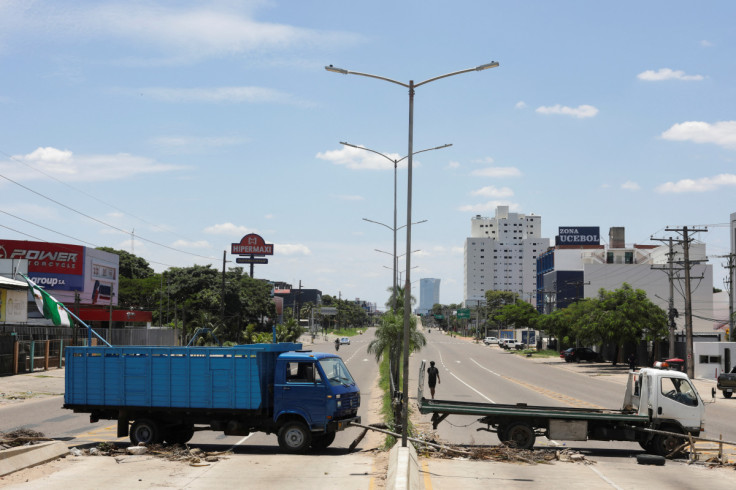
Trucks block a street as part of a "general strike" following the detention of Santa Cruz opposition governor Luis Fernando Camacho, for whom prosecutors are seeking pre-trial detention in connection to the 2019 political unrest, in Santa Cruz de la Sierra, Bolivia, December 30, 2022. REUTERS
Protesters in Bolivia's Santa Cruz, a relatively wealthy farming region, attacked buildings, burned cars and blocked highways as part of a 24-strike on Friday following the arrest of the regional governor, a right-wing opposition leader.
As night fell, protesters in parts of the provincial capital torched cars and tires and hurled fireworks toward police, who used tear gas to try to disperse the crowds.
Pedro Vaca, Special Rapporteur for Freedom of Expression for the Inter-American Commission on Human Rights (IACHR), said in a post on Twitter he was receiving reports of "severe attacks" on the media, attributed to police deployments.
"I call on the authorities to give public instructions to their agents on the duty to guarantee freedoms of press, peaceful assembly and association," he said.
During the day, largely peaceful groups had protested around the city by blocking roads with tires, rocks and flags strung across streets as blockades.
The protests are the latest face-off between Santa Cruz, led by Governor Luis Fernando Camacho, and leftist President Luis Arce's government.
Camacho was detained Wednesday on a charge of "terrorism" for his alleged involvement in 2019 political unrest that saw then-President Evo Morales flee the country.
He was sentenced to four months of pre-trial detention late Thursday and was transferred to a maximum security prison early Friday morning.
Camacho has maintained his innocence and called his arrest and transport to La Paz, the country's capital, a kidnapping. Prosecutors denied the arrest was a kidnapping or politically motivated.
The governor became a face for the right-wing opposition movement as a civic leader who called for Morales to step down in 2019. On Twitter Friday morning, Camacho's communications team said the fallout from the contested election "was not a coup, it was fraud."
Camacho also led weeks-long protests snarling trade from the region through last month, calling for the government to move up a census date that would likely give Santa Cruz more political representation and tax revenues.
The government has not said how it will respond to Friday's roadblocks, though some military forces were spread throughout Santa Cruz late Thursday. In the last round of protests, government-allied groups violently clashed with Camacho supporters.
Meanwhile, some companies said they would pause sales while Camacho remained in jail.
Protesters in Bolivia's Santa Cruz, a relatively wealthy farming region, attacked buildings, burned cars and blocked highways as part of a 24-strike on Friday following the arrest of the regional governor, a right-wing opposition leader.
As night fell, protesters in parts of the provincial capital torched cars and tires and hurled fireworks toward police, who used tear gas to try to disperse the crowds.
Pedro Vaca, Special Rapporteur for Freedom of Expression for the Inter-American Commission on Human Rights (IACHR), said in a post on Twitter he was receiving reports of "severe attacks" on the media, attributed to police deployments.
"I call on the authorities to give public instructions to their agents on the duty to guarantee freedoms of press, peaceful assembly and association," he said.
During the day, largely peaceful groups had protested around the city by blocking roads with tires, rocks and flags strung across streets as blockades.
The protests are the latest face-off between Santa Cruz, led by Governor Luis Fernando Camacho, and leftist President Luis Arce's government.
Camacho was detained Wednesday on a charge of "terrorism" for his alleged involvement in 2019 political unrest that saw then-President Evo Morales flee the country.
He was sentenced to four months of pre-trial detention late Thursday and was transferred to a maximum security prison early Friday morning.
Camacho has maintained his innocence and called his arrest and transport to La Paz, the country's capital, a kidnapping. Prosecutors denied the arrest was a kidnapping or politically motivated.
The governor became a face for the right-wing opposition movement as a civic leader who called for Morales to step down in 2019. On Twitter Friday morning, Camacho's communications team said the fallout from the contested election "was not a coup, it was fraud."
Camacho also led weeks-long protests snarling trade from the region through last month, calling for the government to move up a census date that would likely give Santa Cruz more political representation and tax revenues.
The government has not said how it will respond to Friday's roadblocks, though some military forces were spread throughout Santa Cruz late Thursday. In the last round of protests, government-allied groups violently clashed with Camacho supporters.
Meanwhile, some companies said they would pause sales while Camacho remained in jail.
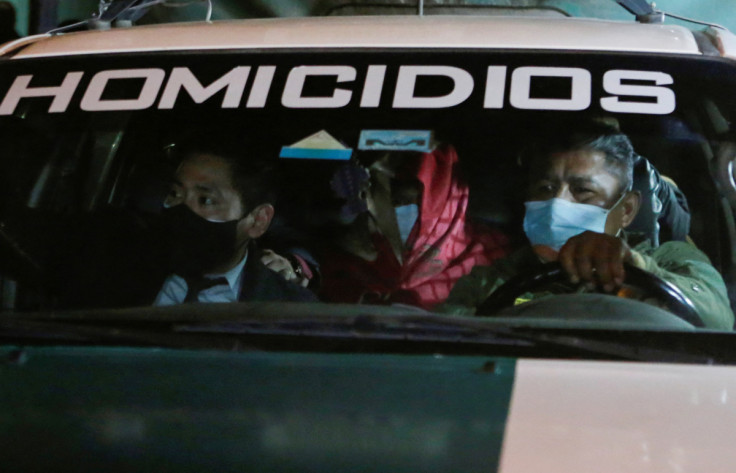
Santa Cruz opposition governor Luis Fernando Camacho covers his face as he is escorted in a police car, as he is transferred to a prison in La Paz, after a Bolivian court sentenced him to four months of pre-trial detention, a day after his arrest in connection to 2019 social arrest that saw former leftist President Evo Morales flee the country, in La Paz, Bolivia, December 30, 2022. REUTERS
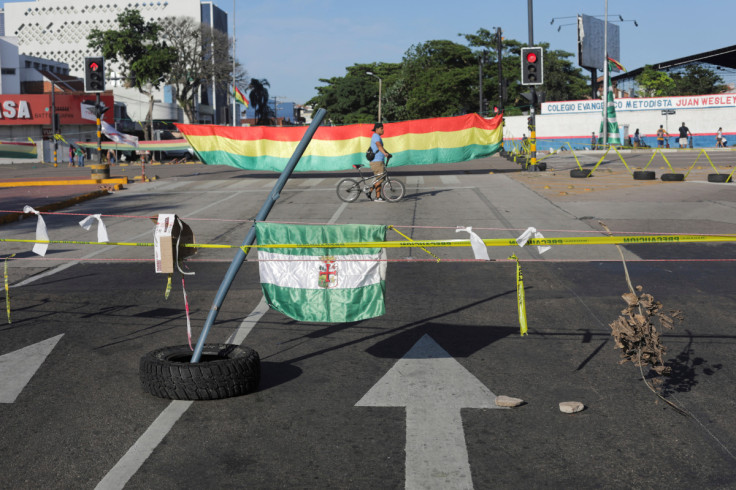

A man crosses a street blocked by demonstrators as part of a "general strike" following the detention of Santa Cruz opposition governor Luis Fernando Camacho, for whom prosecutors are seeking pre-trial detention in connection to the 2019 political unrest, in Santa Cruz de la Sierra, Bolivia, December 30, 2022. REUTERS
© Copyright Thomson Reuters 2022. All rights reserved.
© Copyright Thomson Reuters 2022. All rights reserved.
No comments:
Post a Comment